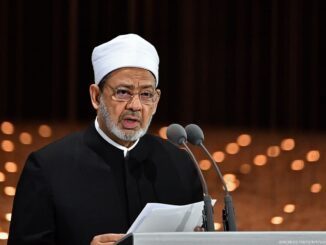
Al-Azhar, Egypt’s top Islamic authority, has rejected Abdel-Fattah al-Sisi’s recent calls to reduce Egypt’s escalating divorce rate by ending verbal divorce.
On January 24, during a speech at the Police Academy, al-Sisi referenced a 2015 report published by the Central Authority for Public Mobilization and Statistics (CAPMAS), highlighting Egypt’s burgeoning divorce rates.
In fact, 2015 has witnessed a 10.8 % increase in the number of divorces, reaching almost 200,000 cases compared with approximately 180,000 the previous year.
As a result, al-Sisi proposed enacting a law to end the practice of verbal divorce, calling divorce a threat to social stability.
During the televised address al-Sisi turned to the Grand Imam of al-Azhar, Ahmed al-Tayeb and said with a smile “What do you think, your eminence, the imam?” indirectly acknowledging that he needed al-Azhar’s backing for his proposed legislation.
Al-Tayeb, appointed by presidential decree, heads the Council of Senior Clerics.
However, the Council of Senior Clerics in Cairo-based al-Azhar – the highest authority in Sunni Islam – unanimously ruled that verbal divorce, when meeting all requirements, has been an undisputed practice since the days of the 7th century Prophet Muhammad, in a big blow to al-Sisi’s suggestions last month.
Al-Azhar explained the requirements saying that it included that the man has a sound mind, full consciousness and uses appropriate phrasing. Muslim women in Egypt cannot verbally divorce their husbands but can apply for divorce in a court of law.
As a result, the council addressed in a carefully-worded statement “the people” and it didn’t mention al-Sisi or his suggestion last month for legislation requiring such divorces to be carried out in the presence of a state-authorized cleric.
In fact, al-Azhar stance is considered a rare instance of a public institution contradicting the head of state, who reached power through military coup in 2013 against Egypt’s first democratically elected President Mohamed Morsi.
On the other hand,the council expressed concern over the high rate of divorce in Egypt, where 40 %of marriages end in divorce within five years, according to figures cited by the president.
But it pointed out that the figures include only documented divorces, suggesting that reducing the number of verbal divorces would have little impact.
In this context,Ayman al-Sayad, an analyst who closely monitors religious affairs, said that al-Azhar’s rejection of the proposal showed that it has “drawn a clear line between religion and politics.”
“It has decisively settled the issue, but went to great lengths so as not to appear confrontational,” he added.
It is worth to mention that al-Sisi, whose public comments are often peppered with Quranic verses or mentions of God, has repeatedly called for moderating Islam’s discourse to counter extremism.
Recently, he ordered his authorities to standardize Friday sermons in mosques across Egypt, a move billed as combating extremism but it was faced with massive criticism as it tightens freedom of speech.
In addition, the author and columnist Basma Abdel-Aziz, said “The statement was a cautious to push back against al-Sisi, asserting a measure of independence for al-Azhar in the face of a president who seeks to rally everyone and every institution behind him.”
She added,”But it also reflects the influence wielded by senior conservative clerics in an institution that prides itself on being the chief propagator of moderate Islam while remaining a bastion of religious conservatism.”



